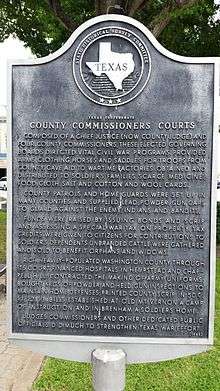County commission

A county commission (also known as a board of county commissioners) is a group of elected officials charged with administering the county government in some states of the United States. County commissions are usually made up of three or more individuals. In some counties in Georgia and New Hampshire however, a sole commissioner holds the authority of the commission.
The commission acts as the executive of the local government, levies local taxes, administers county governmental services such as prisons, courts, public health oversight, property registration, building code enforcement, and public works such as road maintenance. The system has been supplanted in large part as disparate sparsely settled regions become urbanized and establish tighter local governmental control usually in municipalities, but in many more rural states the county commission retains more control and even in some urbanized areas may be responsible for significant government services.
History
William Penn, colonial founder of Pennsylvania is credited with originating the system of County Commissioners in the United States.
On February 28, 1681, Charles II granted a land charter[1] to William Penn to repay a debt of £16,000[2] (around £2,100,000 in 2008, adjusting for retail inflation)[3] owed to William's father, Admiral William Penn. This was one of the largest land grants to an individual in history.[4] It was called Pennsylvania. William Penn, who wanted it called New Wales or Sylvania, was embarrassed at the change, fearing that people would think he had named it after himself, but King Charles would not rename the grant.[5] Penn established a government with two innovations that were much copied in the New World: the county commission and freedom of religious conviction.[4]
See also
- County board of supervisors
- County council
- County executive
- Board of chosen freeholders (New Jersey)
- Commissioners' Court (Texas and Missouri; identical concept known in Arkansas as "Quorum Court")
- Fiscal Court (Kentucky)
- Police Jury (Louisiana)
- Sole commissioner
References and footnotes
- ↑ Charter for the Province of Pennsylvania-1681. This charter, granted by Charles II (England) to William Penn, constituted him and his heirs proprietors of the province, which, in honor of his father, Admiral William Penn, (whose cash advances and services were thus requited,) was called Pennsylvania. To perfect his title, William Penn purchased, on 1682-08-24, a quit-claim from the Duke of York to the lands west of the Delaware River embraced in his patent of 1664
- ↑ Pennsylvania Society of Colonial Governors, ed. (1916). "Samuel Carpenter". Pennsylvania Society of Colonial Governors, Volume 1. pp. 180–181.
- ↑ "Measuring Worth". Measuring Worth. Retrieved July 31, 2010.
- 1 2 "Quakers and the political process". Pym.org. March 28, 2006. Archived from the original on May 24, 2008. Retrieved July 31, 2010.
- ↑ Fact About Wales and the Welsh.